Changes to NT’s liquor licencing laws to give BYO, community groups faster applications
New proposed laws will allow pharmacies to track how often people are filling scripts for dangerous medications. Parliament is also debating major changes to the NT’s liquor laws. LATEST HERE.
Northern Territory
Don't miss out on the headlines from Northern Territory. Followed categories will be added to My News.
UPDATED THURSDAY AFTERNOON: REAL time prescription monitoring and faster BYO liquor licences could be made law as soon as November after a busy day of parliament on Thursday.
On the final day of October sittings, Health Minister Natasha Fyles said changes to the Territory’s Therapeutic Goods Act would allow pharmacists to see whether addicts were filling scripts for dangerous drugs such as codeine at multiple pharmacies.
Ms Fyles said the amendments would “allow for real-time prescription monitoring to be established in the Northern Territory”.
“Many Schedule 8 medicines carry a high risk of overuse, and can be used for illegal uses, dependence and occasionally in tragic circumstances, overdose and death,” she said.
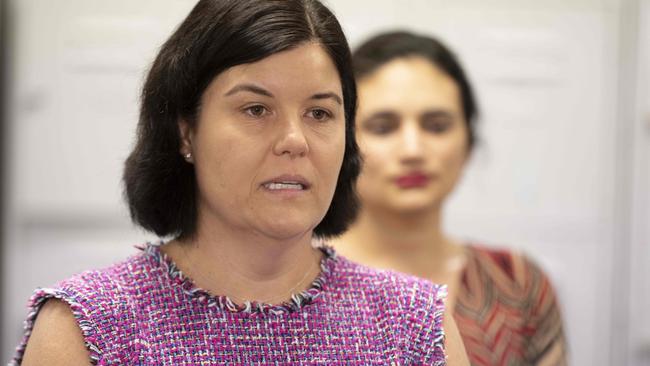
“These medicines include opioid pain medicines, medicines to help manage anxiety, stimulant medications for conditions such as such Attention Deficit Hyperactive Disorder.”
The changes would allow a single database that means prescribers and pharmacies have a “complete and accurate history of the patient’s supply of the medicines being monitored”.
Changes to liquor licencing laws were also debated on Thursday, with small businesses expected to get a speedier application process.
The government said applications for BYO licences, which currently cost up to $20,000 and take as long as fully licenced applications, would be streamlined under the changes.
Ms Fyles said the current process for BYO applications was “onerous” and at times encouraged the illegal sale of alcohol.

Community organisations that served alcohol for less than four hours a week would also be allowed to apply for community licences.
CLP Alcohol Policy spokesman Gerard Maley expressed concern the changes would be a “classic example” of adding more red tape.
“I’m really concerned that it might capture small businesses which aren’t related to alcohol, like a mechanic, or a fishing charter, or some sort of four-wheel drive charter, where there’s no alcohol involved, there’s no food involved, but their clients bring an Esky,” Mr Maley said.
“Now they’re going to have to, in my understanding, apply for a BYO licence – that’s more red tape.”
UPDATED WEDNESDAY MORNING: HEALTH Minister Natasha Fyles has introduced changes to the Territory’s abortion laws which will give women more time to consider a termination of pregnancy if their fetus has complications.
The proposed changes would remove the requirement for women needing examination by two doctors up to 24 weeks, which Ms Fyles said brings the NT in line with Victoria, Queensland, South Australia and the ACT.
They will need examination by just one doctor instead.
It will also extend the gestational limit from 23 to 24 weeks, again in line with other states and territories.
“The next key legislative change is allowing a termination of pregnancy after 24 weeks after consultation between two medical practitioners has occurred,” Ms Fyles said.
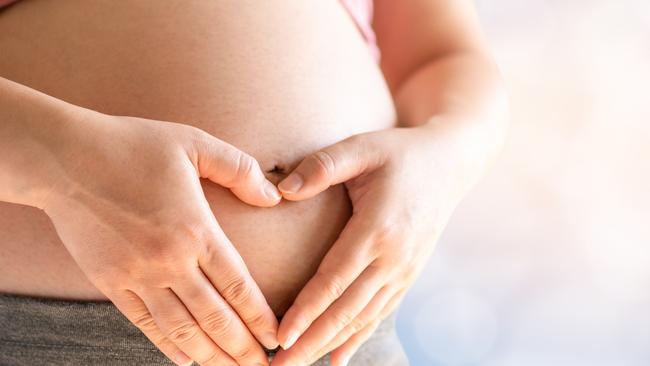
She said the laws would mean women seeking a termination at certain stages of pregnancy wouldn’t have to travel interstate.
“The women of the Northern Territory deserve improved access to safe options for the termination of pregnancy,” she said.
“No other medical procedure is so heavily legislated.”
MLAs will be briefed on the changes, with a vote expected during the next parliamentary sittings in November.
UPDATED TUESDAY EVENING: THE Opposition has sought to declare the state of the Northern Territory’s healthcare system as a Matter of Public Importance in parliament.
It follows four Code Yellows being declared at the Royal Darwin Hospital (RDH) over the past year, and the decision to close a third of emergency beds at the Palmerston Regional Hospital (PRH).
CLP leader Lia Finocchiaro said the motion was moved because of staff shortages, remote clinic closures and the ramping of ambulances “like they’re at some sort of McDonalds drive-through” at RDH.
“I was speaking to someone who said to me they’ve had their elective surgeries cancelled three times,” Ms Finocchiaro said.
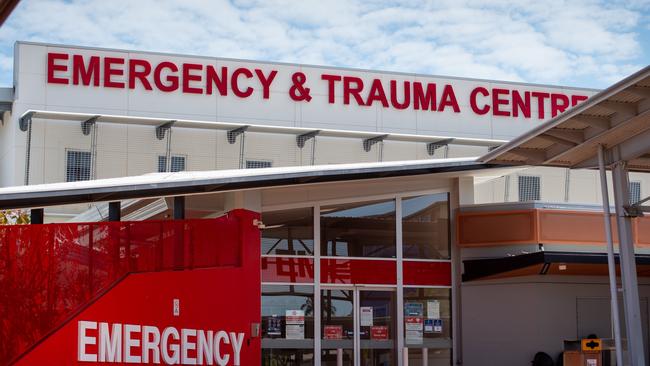
She also expressed concerns about changes to the PRH as part of an ongoing review of the facility.
“People are genuinely scared about what Labor will do next to the Palmerston Regional Hospital.”
Ms Finocchiaro said the hand over of the Howard Springs quarantine facility had exacerbated staffing shortages in the Territory’s hospitals.
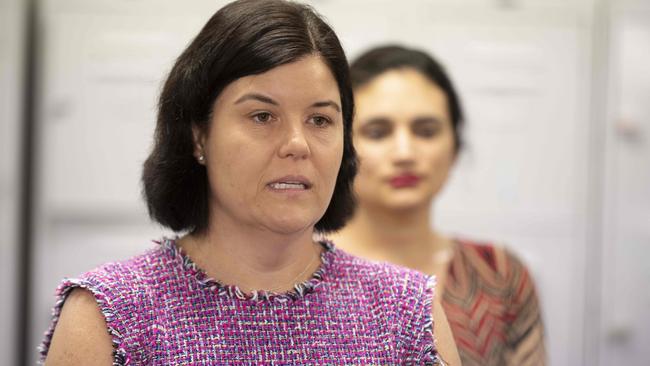
“There is no question that has had a huge impact across the whole sector,” she said.
“Instead of handing it back to AusMAT … you’re just bullishly pushing on.”
When asked on Monday, Health Minister Natasha Fyles said she didn’t know whether the third of beds at PRH closed last month had been reopened.
In parliament on Tuesday, Ms Fyles said there had been a 39 per cent increase in emergency presentations over the past five years.
But she said Code Yellows were implemented during surges in demand to help manage caseloads.
“Our staff have done an incredible job and I thank them – not just the doctors and the nurses and the allied health professionals, but the cleaners … and the administrative staff.”
Ms Fyles labelled Ms Finocchiaro’s comments on Palmerston Regional Hospital as “scaremongering” and said the facility was still providing emergency care for Palmerston and the rural area.
She said 43 nurses had commenced work last week and recruitment for more was “ongoing”.
UPDATED TUESDAY NOON: THE government has moved to slap down “outrageous” comments made by the CLP’s Josh Burgoyne in parliament on Tuesday, in which he claimed Labor had installed political allies to the Territory’s electricity generator.
Mr Burgoyne, debating on changes to the NT’s electricity legislation, suggested appointments to T-Gen were politically motivated.
“It’s not that we don’t support a move to renewables, but we do believe in the idea of being hamstrung along the way, which is what you’ve proven with some of the public decisions and messes along the way,” he said.
“For example, the public sacking of the Territory Generation board to install key (a) well-known Labor government appointment.”
Mr Burgoyne also said Territory Generation had been involved in renewable technology and expressed doubt that Labor’s climate targets could be met.
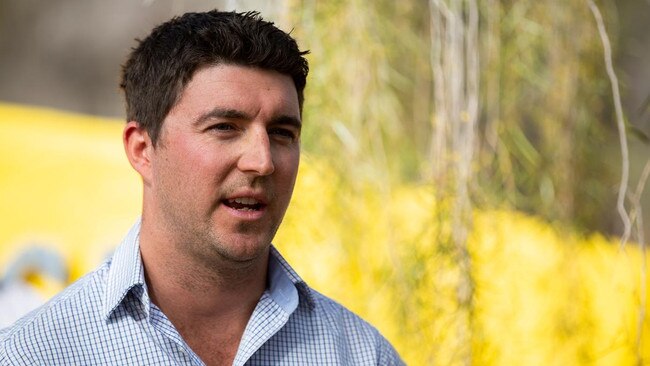
“If we are moving towards 50 per cent renewables in 2030, and the main generator, the burner of fossil fuels, is forecasting an increase in electricity at the halfway target in five years’ time, how on earth are we going to achieve that target?”
Both Attorney-General Selena Uibo and Small Business Minister Paul Kirby later pushed back on the comments.
“I’m not exactly sure where to start with some of the comments for (Mr Burgoyne),” Mr Kirby said.
He later said changes to Territory Generation’s management came after an “independent review found that the responsibility for major blackouts in the centre of Australia fell with particular people and there needed to be changes made”.
MONDAY: MAJOR changes that will bring the Northern Territory’s abortion laws into line with other states and territories will be introduced to parliament this week.
Under the new laws, women will be allowed to terminate their pregnancies with just one doctor at 24 weeks rather than the existing 14 weeks.
Women will be able to terminate their pregnancies after 24 weeks in the event of unexpected complications.
The NT Legislative Assembly will also consider changes to the Territory’s liquor laws and electrical regulations when it sits on Tuesday, Wednesday and Thursday.
Health Minister Natasha Fyles said the changes to abortion laws were a “modernisation”.
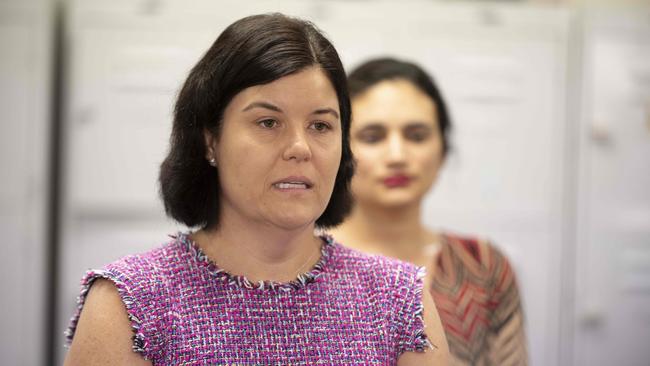
“We estimate that this will only impact a small number of Territory women – around half a dozen each year – but for those women and their families, it’s hugely important,” Ms Fyles said.
“For women, when they have their 20 week scan it can be a time where absolute joy turns to tragedy and they find out that there is complications with their pregnancy.”
Ms Fyles said women were being forced to travel interstate to access specialist abortion services
The laws will be introduced into parliament during this week’s sittings and then debated during the next session in late November.
Changes could also be made to the Territory’s liquor laws, easing the application process for liquor licences for community groups.

Ms Fyles said the changes were being made due to “inadvertent” consequences of previous reforms that meant smaller organisations, such as art galleries, were being subject to the full application process.
In addition, Territory pharmacists will also be able to better monitor for abuse of prescription drugs and changes would be made to better track renewable energy production.
Opposition Leader Lia Finocchiaro said the CLP would focus on holding the government to account over youth crime and domestic violence rates. Ms Finocchiaro also flagged further debate about restoring three lost days of parliamentary sittings due to a lockdown in August.
“There are only six sitting days left for the rest of the year,” she said.
“I know the Gunner government think that they can squeeze their business into the remaining sitting days, but they certainly haven’t offered us double Question Time or double (general business day).”





